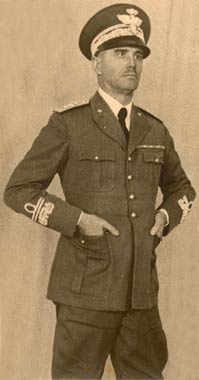Guglielmo Nasi
| Guglielmo Nasi | |
|---|---|
 |
|
| Born | 21 February 1879 Civitavecchia, Italy |
| Died | 21 September 1971 (aged 92) Modena, Italy |
| Allegiance |
|
| Service/branch |
|
| Years of service | 1924–1945 |
| Commands held | Chief of Staff for the Colonial Troops in Africa Vice-Governor of Cyrenaica Governor of Harar Governor of Shewa Vice-Governor of Italian East Africa |
| Battles/wars | |
| Awards |
|
| Other work | UN Commissar for Somalia |
Second Italo-Ethiopian War
World War II
Guglielmo Ciro Nasi (21 February 1879 – 21 September 1971) was an Italian General who fought in Italian East Africa during World War II.
Nasi was born in Civitavecchia, Latium. From 1924-1928, he was the military representative of the Italian Regio Esercito (Royal Army) in Paris.
In 1928, Nasi was sent to the Italian colonies as Chief-of-Staff for the Colonial Troops and was Vice-Governor of Cyrenaica in 1934-1935, Governor of Harar from 1936–1939, and Governor of Shewa in 1939-1940. He also served as a Vice-Governor of Italian East Africa from 1939. Nasi promoted a moral reformation of the military and civil administration and he showed notable skills in dealing with indigenous chiefs.
In April 1936, during the Second Italo-Abyssinian War, Nasi commanded the left column of three columns during Generale Rodolfo Graziani′s advance on the southern front. Most of Nasi's troops were Libyans.
After the beginning of World War II, Nasi led the Italian conquest of British Somaliland in August 1940. He successfully invaded British Somaliland and, with the advantage of air cover and tanks, forced the defending British and Commonwealth forces to evacuate by sea to Aden after defeating the main body of their army at the Battle of Tug Argan from 11-15 August.
In early 1941, during the British counter-offensive, Nasi was forced to retreat to the stronghold of Gondar.
...
Wikipedia
